Susan Wiggs's Blog, page 18
June 6, 2016
signed first edition
It’s like finding a four-leafed clover–rare, and lucky. My very thoughtful publisher arranged for me to sign a very limited edition of just six thousand copies.
[image error]
Why thoughtful? The logistics can get complicated.
Six thousand blank pages are shipped to me. They filled three shipping boxes. [image error]
I spend a month of evenings signing pages and binge-watching TV series. My binge-watching (the ones I’ll admit to, anyway): Nurse Jackie, House of Cards, The Americans, America’s Test Kitchen, 11-22-63, Confirmation, OJ Simpson.
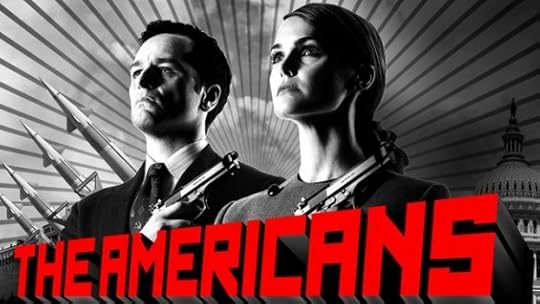
For me, the best pen for swift signing is this.
Some of the pages get a feather stamp, because there’s a feather in my logo. (see above)
Then I ship the signed pages back to the bindery. I included something sweet in the box and a thank-you note, because my mama raised me right. [image error][image error]
The bindery will insert the pages into the hardcover print edition. [image error]
Et voila! The print edition is ready to pre-order from your friendly local (or maybe not so local) bookseller–Books-a-Million, Eagle Harbor Books, Barnes&Noble.
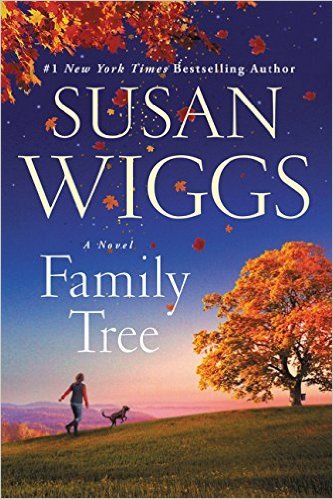
The post signed first edition appeared first on SusanWiggs.
May 23, 2016
today’s neologism*
While writing dialogue for a teenage character today, I made up a new synonym for “handsome” or “hot”: HEMSWORTHY. As in, “I think he’s totally Hemsworthy.” It needs no explanation.

More Hemsworthiness here.
*A neologism is a newly made-up word. You’re welcome.
The post today’s neologism* appeared first on SusanWiggs.
every time you pre-order a book, an angel gets its wings
Well, that’s what writers think, anyway. In the world of publishing, pre-orders are everything. I always pre-order from my favorite writers. It’s a nice little surprise to open my e-reader and find the new book waiting for me on its day of publication. Or when I get that “your book is in” call from the local bookshop. Or when the dogs herald the Most Holy Arrival via UPS. Here are a few more reasons I love pre-orders.
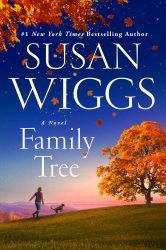 Preorder now…get a surprise on August 9!
Preorder now…get a surprise on August 9!My publisher’s web site (and my own, come to think of it) features links to pre-order from many of your favorite retailers. And for those who get their books from the library, you can file a request at your local branch.
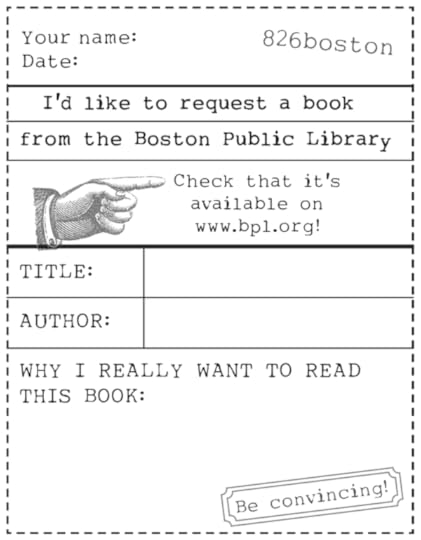
Just give this info to any librarian or bookseller, and they’ll do the rest:
family tree
ISBN: 9780062425430
ISBN 10: 0062425439
Imprint: William Morrow
On Sale: 08/09/2016
Trimsize: 6 in (w) x 9 in (h) x 1.17 in (d)
Pages: 368
List Price: 25.99 USD
BISAC1: FICTION / General
BISAC2: FICTION / Contemporary Women
BISAC3: FICTION / Mystery & Detective / Traditional
If you’re a commitment-phobe, here’s a sweet little story for just $1.99.
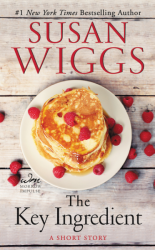 Every great love story has a beginning…(and who doesn’t love pancakes?)
Every great love story has a beginning…(and who doesn’t love pancakes?)The post every time you pre-order a book, an angel gets its wings appeared first on SusanWiggs.
May 22, 2016
on fire
Confession–series books are like crack to me. No, like potato chips. You start with one, and end up consuming the whole bag!

Reading is more healthy than chips. Just saying. The good news in my world is that there’s a “First In Series” promotion going on over at B&N. Someone over there is determined to get their hooks into us, and get us going on another series of books!
There is a writer’s backstory behind the Chicago Fire Trilogy. (Feel free to skip this if you think knowing how a book gets written is like knowing how sausage is made.) I had a deadline challenge–writing 3 books in a very short time span.

(Seriously? Making out while the city burns? Well, why not?)
With time being so short, I didn’t have time to research three different historical settings, so I decided to have all three books take place in the same city on the same night. Four young ladies, all at the same party, who scatter in four directions as the first swept through the city. Thank goodness for this organization, which was a treasure trove of primary source material.

I even wrote the same scene in each book, but from different perspectives. If you read the trilogy–and you should, because the e-book is so stinkin’ cheap–see if you can spot it.
Oh, and there IS a fourth book in the series, starring Phoebe Palmer. I haven’t written it yet, but it’s on my back burner, so to speak.
So there you have it. What’s your favorite series? Chime in below! Summer is coming, and I need suggestions!
The post on fire appeared first on SusanWiggs.
May 18, 2016
writing your novel :: here’s what it takes
…in which we celebrate my remodeled web site with a Q&A, courtesy of Catherine Dugoni in Mrs. Fox’s 10th grade class.
What types of novels do you write? Why do you choose to write those types of novels?
I write what’s known as commercial fiction or women’s fiction. I’ve also published contemporary romance novels and historical romance novels. Like most writers I know, I write what I love to read. I picked up a paperback romance while studying some horrid advanced math topic in college, and it gave my mind a welcome break. Ever since that time, my goal has been to write the kind of books that uplift and entertain readers when they most need it.
When did you get your first novel published? What was that feeling like?
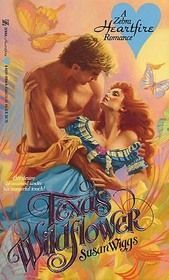
I sold my first novel in 1986, and it was published in 1987. At that time, I was in my 20s, a math teacher at the Kinkaid School in Houston. I was also a young mom and schoolteacher with a toddler and two dogs. When the editor called me to say she wanted to publish my book, one of the dogs had just yarked on the floor and the baby was making a beeline for it. This was before cordless phones, so I simply took the phone call. I guess you could say my feelings were mixed, but since I was achieving a huge goal, it was a great feeling of accomplishment. But it was not glamorous!
Were your novels rejected before you first got them published? How many times and how hard was that?
I stopped counting my rejections. Back in the ‘80s, there were a lot more publishers for the kind of books I was writing. Nowadays, there are just a few major traditional publishers left–HarperCollins, Random House, St. Martin’s, Simon & Schuster, Hachette. An emerging writer gets rejected by the literary agents she contacts to represent her work, and she gets rejected by editors who work for the publishers. I sent my work out dozens and dozens of times, and received both form and personal rejection letters. It was hard in the sense that I had to keep working at my craft and I had to keep sending out my work. It was NOT hard because I knew I had set an ambitious goal for myself, but it was something I wanted. And how hard is it to go for something you want?  Do you make a living as an author? And what percentage makes a living as authors?
Do you make a living as an author? And what percentage makes a living as authors?
I’ve made a living as an author for the past twenty-five years, and I was the sole income for my family up until I remarried in 2012. This is an extremely rare situation for an author, but I’ve worked hard, made good choices and sought out the best people in the business. A writer is self-employed and works from contract to contract, so it definitely has ups and downs based on sales, the market, trends and the economy in general. The percentage of writers who make a living at their craft is incredibly tiny! If you want a number, you could contact authorsguild.org to find out the results of their regular survey. (The Authors Guild is a great resource.)
What’s the best part of your job? What’s the worst part of your job?
The best part of my job is writing and talking about writing (like this interview) and hearing from readers. At the moment, it’s pouring rain outside, but I can look out my window and see the ferry chugging past my beach. Mount Rainier is visible in the distance, despite the rain. There’s a roaring fire in my living room, a chihuahua sleeping on my legs and a doberman lying on the floor next to me. I’m drinking a mug of PG Tips tea and making stuff up that will ultimately be published in 2017. 
The worst part of my job is taking care of business. As I mentioned above, a writer is self-employed, so she has to be on top of bookkeeping and accounting, promotion and marketing, social networking, tech support–everything a large business does, only she’s just one person and it can be awful. For example, I just spent about an hour on the phone trying to get help installing WordPerfect X7 on a new computer. (That is my writing software of choice.) That’s an hour I don’t get to spend writing, and it’s frustrating. But then I tell myself, people go to jobs they hate, every day, so I can get through this hour and get this done.
Where do you get your ideas?
Another Dr. Seuss quote: “I get all my ideas in Switzerland near the Forka Pass. There is a little town called Gletch, and two thousand feet up above Gletch there is a smaller hamlet called Über Gletch. I go there on the fourth of August every summer to get my cuckoo clock fixed. While the cuckoo is in the hospital, I wander around and talk to the people in the streets. They are very strange people, and I get my ideas from them.”
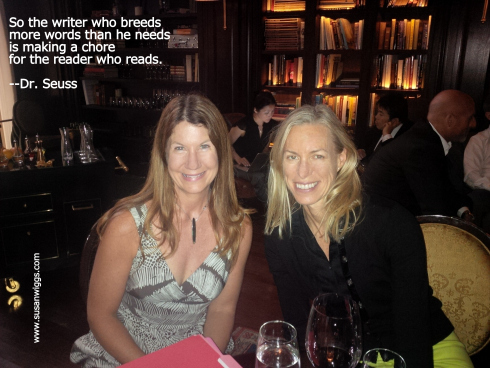
Editor and style maven Margaret Marbury.
What he’s saying in his own inimitable way is that ideas come from everywhere–a photograph of a stranger. A childhood memory. A chance remark by a friend. A brainstorming session with other writers. Inspiration is everywhere. I usually know I’ve hit on something when I feel it in my gut. The idea intrigues me–What happens when a woman wakes up from a coma to discover her husband has divorced her and left her penniless? (Family Tree) What if a squabbling couple drives of a cliff and dies, and their wills leave the kids to two different people? (Table For Five). What if a woman drives her daughter across the country to college, and all along the way, they sort out their issues? (The Goodbye Quilt) What if a high school girl interviews an author and learns a huge secret, eh?
How much research do you have to do?
Probably more than you would suspect when reading one of my novels. Research is constant. Every geographical location and every time period has to be researched until it feels authentic to the reader. Every career a major character has–same thing. You have to sound like an expert, whether you’re writing about an EA-6B Prowler pilot (The Ocean Between Us), a photographer who is losing her vision (Home Before Dark) or a maple syrup producer (Family Tree).
The trick is to do enough research to sound authentic without boring the reader. The other trick is to keep from spending all your time on research.
Do you outline your books or do you just freely write?
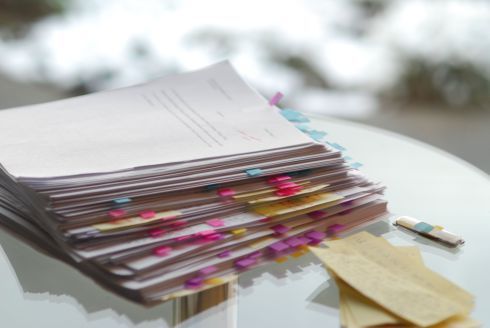
Note the snow on the ground…
Both. I start with a general idea and a sketchy outline, a few pages talking about the character, situation and setting. I write a more detailed synopsis (I’m using this term interchangeably with outline) to make sure the pieces of the story all fit together, and then I write. I compose the book in longhand, in a Clairefontaine grid-ruled notebook, using a fountain pen with peacock blue ink. There are a couple of reasons for this. 1) I’m left-handed so I need quick drying ink that doesn’t smear as I drag my hand over the page. 2) I wrote lots of journals when I was young and so I associate these tools with creativity and fun. 3) With paper and pen, I’m not tempted to be distracted by the digital world. To some, writing in longhand seems like extra work, but it helps me think and limits distractions. It’s also a shout-out to the early me–the emerging writer dragging her notebook wherever she goes.
Do you write about your interests?
Absolutely. All the topics of my books are topics that are relevant and interesting to me, such as recovering from trauma (Family Tree), caregiving (Starlight on Willow Lake), Nazi plunder (The Apple Orchard), running a cooking school (The Beekeeper’s Ball) or being a librarian in charge of a Christmas Pageant (Lakeshore Christmas) are all examples of things that intrigue me that turned into books.
Was it hard for you to get started as an author?
No. It was hard to make my way to a self-sustaining career as an author. Getting started, meh. I had that mom (see above). It takes incredible focus and a willingness to work hard, hone the craft, fail and pick up the pieces, succeed and follow that success to the next level. There are a lot of people with stories who want to be an author, but are they willing to do what it takes to make it happen? It’s no coincidence that the most successful writers I know (and greatly admire) are also the hardest working–Debbie Macomber. Nora Roberts. Erik Larson. Robert Dugoni. Jodi Picoult. Terry Brooks.
Have you ever gotten writers block? If so, how did you overcome it?
I don’t get writers block, but I do get stuck. I question myself about what should happen next, where it’s going, is it going to work for the story, is it going to lead to a dead end…a writer’s insecurities are legendary. We never know for sure we’re on the right track. So I get stuck. It usually unravels when I’m doing something completely unrelated to the book, such as a long, vigorous dog walk, digging in the garden, riding my bike, sitting in the hot tub…It’s a bit scary to be stuck, because you worry about getting behind on your writing schedule and missing a deadline, but as I’ve said before–If this career was easy, there would probably be more writers in the world.


May 11, 2016
welcome to me :: a working writer tells all
To celebrate Family Tree, my first novel in the William Morrow imprint, we’ve remodeled my website. I’m grateful to the amazing design team at HarperCollins and, as always, to the lovely and talented Willa, who has been my web designer since the web was invented. Please take a look around and let me know what you think.
My blog has been integrated into the site, so here’s a post inspired by Catherine, the very bright daughter of one of my favorite writers and people, Robert Dugoni. She’s a sophomre in high school, but she asks the questions everyone wonders about when they talk to a writer.
When did you know you wanted to be a writer? What led you to want to be a novelist?
[image error]
I have been a writer since I was two years old. I have proof in the form of an old church collection envelope on which I was writing my name at age 2. My mom was so startled to see me writing that she saved the envelope, and I still have it. By age 3, I was illustrating stories and having my mom write them down. (I have an awesome mom). In third grade I learned cursive writing and my teacher, Mrs. Marge Green, said I should write a book. I did, and I still have the book I wrote. You can see samples of my earliest work here.
Since I was a storyteller from birth, I can only think that what led me was the inner urge a human is born with to tell stories. That, and the fact that both of my parents were avid readers. They read all the time, and they read to their kids all the time. I’m sure they read to me as a baby, so I came to associate reading and stories with comfort, security and love. I wish the whole world could have parents like mine!
Here is one of my favorite Dr. Seuss quotes: “You’re never too old, too wacky, too wild, to pick up a book and read to a child.”
Was English always a strong suit in school, or did you struggle through it?
I was one of the lucky ones–the subject came naturally to me and it never felt like work. Straight As. 100% on every test. A standardized test or exam was a cakewalk for me in this area. I was a great speller. I actually liked diagramming sentences and parsing out the structure of a work. My fascination with language and story knows no bounds. So in this sense, English class was a vacation for the mind.
However, there are writers who did struggle with English and schoolwork and the like, yet they’re still incredible authors. A number of writers I know have dealt with learning disabilities. I am in awe of such writers. To struggle in this area, AND achieve success as a novelist, is phenomenal.
What did you study in school?
My undergraduate degrees are in math and French. I have a master’s degree in education. I was a teacher for eleven years, writing in the evenings, on weekends and throughout the summer. Teaching is one of the hardest jobs in the world, but I loved it.
During those years, I had three jobs–teacher, mom, and writer. In order to write, I gave up watching TV and a good amount of sleep. I devoted every evening after my daughter was in bed to writing. It wasn’t easy, but anything worth having is worth sacrificing for.
People who tell me, “I would love to write a book, but I don’t have time” simply don’t want it badly enough. You make time for what’s important to you, so if getting your book written is important, you’ll figure out how to fit it into your life. Get up an hour earlier. Stay up an hour later. Stay at your desk during lunch hour. A dedicated writer is resourceful with her time.
If someone wants to write novels, what should she study in school?
Anything and everything that interests you. Study whatever you want. We know writers who have studied law, medicine, library science, advertising. We know writers who have virtually no formal education at all. You could study literature, creative writing, dance, engineering–anything that trains your mind.
Read novels. Read essays and poetry. Read memoirs and history and nonfiction. Read EVERYTHING.
Write all the time, about anything and everything. Pay attention to the sound and sense of the written word. Let your natural voice come through.
Were you a big reader growing up? Do you still love to read?
Absolutely. I read a book a day and more as a kid. One summer, I read a biography from each letter of the alphabet, A to Z–Jane Addams to Zoroaster–just because. These days, I still read every day–fiction, thrillers, nonfiction, you name it. Reading is a part of my life the way breathing is a part of my life.
When you’re an avid reader, there are books that stay with you for the rest of your days. They become part of your blood and bone as a writer and person. I hope everyone has this collection close to her heart.
Thanks for stopping by. Check back in a couple of days for Part 2 of Catherine’s interview, and we’ll tackle the nitty gritty of what it takes to make a writing career.


May 10, 2016
reading brings us closer
That’s what was confirmed for me during my visit to Argentina for the 42nd Annual International Book Fair. I was a guest of the US Embassies in Buenos Aires and Montevideo, Uruguay. It was love at first sight for me and South America.
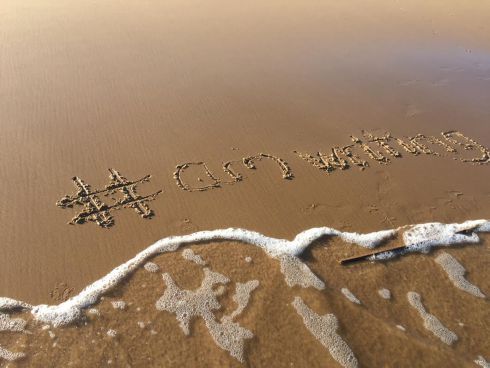
Uruguay has incredible beaches and even better people, wine and food. Tannat, anyone?
Buenos Aires is a feast for all the senses.

(Oh, and it’s fall there. Autumn leaves in May.)
It was extraordinary to sit with women who speak no English and–through a very nimble translator–discover that we are all the same. We love our families, we dream of romance, we’re endlessly curious about the world, and we love to share.
During my presentations for teachers, students and readers, we all had the same questions for each other–how did you get started? Where do ideas come from? What’s the best strategy for a life doing what you love most? How old are you and how much money do you make?[image error]
And what’s up with all this mate? (Mah-tay, a shared social drink of steeped herbs in a hollowed-out gourd).
We’re all alike and we’re all friends because we all agree on the most fundamental principle of all–books matter. Ideas are important. Freedom of expression is everyone’s basic right.
Hasta la vista!
#amwriting #FeriadelLibro #uruguay #argentina


May 5, 2016
choosing your friends wisely :: choosing wise friends
For me, and probably for a lot of writers, self-confidence is a friable and tenuous thing. The least little nay-saying inner voice can derail a whole project. I cherish my friends who inspire me with a sense of possibility. Here is a shout-out to one of the wisest women I know, author Dorothy Allison (remember, her watershed novel is BASTARD OUT OF CAROLINA). 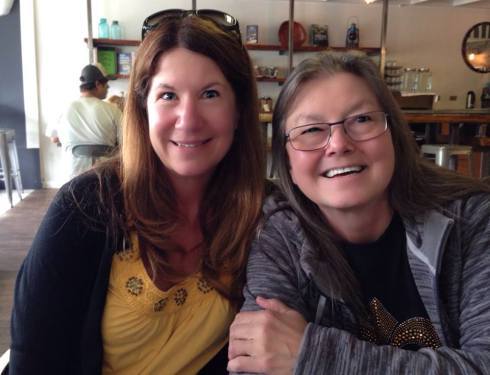 Love this woman. Love her books. Her writing speaks for itself:
Love this woman. Love her books. Her writing speaks for itself:
“I wear my skin as thinly as I have to, armor myself only as much as seems absolutely necessary. I try to live naked in the world, unashamed even under attack, unafraid even though I know how much there is to fear….I tell myself that life is the long struggle to understand and love fully. That to keep faith with those who have literally saved my life and made it possible for me to imagine more than survival, I have to try constantly to understand more, love more fully, go more naked in order to make others as safe as I myself want to be. I want to live past my own death, as my mother does, in what I have made possible for others–my sisters, my son, my lover, my community–the people I believe in absolutely, men and women whom death does not stop, who honor the truth of each other’s stories.” –An excerpt from Skin: Talking about Sex, Class and Literature by Dorothy Allison
Could she be any more honest and brave? Her bio reads like one of her novels, only with a happier ending. Born to a fifteen-year-old unwed mother who quit the seventh grade to work as a waitress, Dorothy learned the power and perils of storytelling at a young age. She recalls “hiding out under the porch” and listening to her aunts tell stories, and entering a library or bookstore “with a sense of desperate passion.” Books were her escape from the world. She told Salon Magazine, “To find a way out of the world as I saw it, I read science fiction. To sustain my rage and hope, I read poetry and mainstream novels with female heroines. And I read books by Southerners for ammunition to use against Yankees who would treat me mean.”
The public library has long been important to Dorothy. “My most profound library memory was the shock I got after we moved to central Florida and I went to the school library there. I was thirteen and had gotten used to the South Carolina school libraries which were pitiful—full of biographies of generals and judges but not much else. The central Florida Library was enormous and had a world of books I could borrow—novels, poetry and theologies, history books, and my favorite section of the Dewey Decimal system—with all those books on the occult. I tried to check out everything—which earned me a quick note from the librarian to my mama asking if she knew what I was reading. ‘Did I have permission to read those books?’ ‘Let her read anything she wants,’ my mama told the lady. But it took a signed letter to get me the access I wanted.
“I think I scared most librarians – because I wanted to read the books they thought I should not read—the grown-up fiction and those plays by Tennessee Williams and Carson McCullers. But the librarian I worked for when I was in my junior and senior years was a marvel. Mrs. James was fearless and just assumed all young women were like her and wanted to read everything. She was the one who told me about inter-library loan. Suddenly I wasn’t just stuck with what was in the Maynard Evans High School Library. I could request books from other High Schools or even the main library downtown.
“By the time I got to the eleventh grade, I had pretty much exhausted the new books, but Lyndon Johnson’s war on poverty got me an after-school job at the school library where I got to record and accession all the new books. That meant I got to read them first. I am still grateful to Lyndon Johnson, and always will be. He may be known to everyone else for his role in the Viet Nam war, but to me he will always be the man who helped me save money for college and made it possible for me to first read the collected poems of Muriel Rukyeser.”
For Dorothy, the library was “the secret world where I could go hide and fall out of this world and into that other one where anything was possible. It had solid wooden tables, sturdy chairs, carpets and air conditioning. If I could have, I would have moved in and lived there. As it was, it was my home away from home—a refuge and a promise. I used to sit on the floor and lean against the bookcases, lean back and dream about having my own place some day—a place where books would be stacked just as high—novels and anthologies and blank books in which I could write my own poems. The library made me think all that was possible, and it was.
“I think the best thing about the library is and was how it always felt to me—not just that it was the repository of what I loved—books themselves—but that it was a place in which a reverence for the word was implicit. Libraries have always seemed to me temples of wisdom—places where study and quiet concentration were honored, and where wanting to read was admired, not held in contempt. I was the child of a truck driver and a waitress, a girl who lived in a claustrophobic house where both the television and the radio were playing loud all the time. The only books in our house—other than the few that were my own—were the big illustrated Bible and my mama’s collection of Mickey Spillane and Ross MacDonald. It worried my family that I tended to hide in a corner and read so much. I was constantly being told to ‘put down that book and go out and play’. But at the library, no one interrupted me, or if they did, they did it softly and with respect. At the library, reading was holy—which is how it felt to me, how it still feels to me.
“In my house, I limited my son’s access to computer and video games, but the house rule on books is simple. If he wants to read it, we will try to find it. And we not only go to the library frequently, we donate books to our local libraries all the time. I want the children in my county to have what I always wanted—new novels on the shelves waiting to be read. It’s just lucky that now publishers actually send me many of them, so that I, in turn, can pass them on.”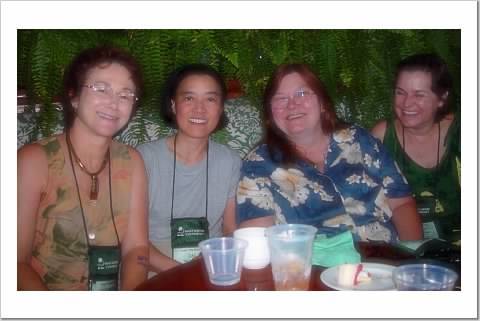
The Greenville, South Carolina native describes herself as a Southern novelist, feminist, confirmed flirt, femme, expatriate rebel, and born-again Californian. In a 1999 Salon interview, Dorothy says, “I was born to a very poor, violent family where most of my focus was purely on survival, and my sense of self as a lesbian grew along with my sense of myself as a raped child, a poor white Southerner and an embattled female. I was Violet Leduc’s Le Batard much more than I was Le Amazon, that creation of upper-class Natalie Barney. People tell me that class is no longer the defining factor it was when I was a girl, but I find that impossible to fully accept. Class is always a defining factor when you are the child one step down from everyone else.”
At the age of thirteen, she “…was always calculating how to not kill myself or how not to let myself be killed. That tends to stringently shape one’s imagination. I did not plan to fill up a hope chest and marry some good old boy and make babies….I was a smart, desperate teenage girl trying to figure out how to not be dismissed out of hand for who I was. I wanted to go to college, not become another waitress or factory worker or laundry person or counter-help woman like all the other women I knew. Everywhere I looked I saw a world that held people like me in contempt.”
After winning a National Merit Scholarship, Allison attended college and went on to study anthropology at the New School for Social Research. But storytelling was in her bones, and that, combined with an awakening feminist spirit, informs and inspires her award-winning work. For Dorothy, feminism “…was like opening your eyes under water. It hurt, but suddenly everything that had been dark and mysterious became visible and open to change.” The author believes her first book, The Women Who Hate Me, (1983) “wouldn’t have happened if I hadn’t gotten over my own prejudices, and started talking to my mother and sisters again.”
Her literary influences are surprising. One was Flannery O’Connor — “that astonishing, brave visionary who told hard truths in a human voice — an outsider holding a whole society up to a polished mirror. She was as ruthless as one of her own characters, and I loved her with my whole heart…If I set aside Flannery O’Connor, I would have to say that science fiction made me who I am today. I spent my childhood buried in those books. Every science-fiction novel I fell into as a child…widened my imagination about what was possible for me in the world. There were those perfectly horrible/wonderful stories about barbarian swordswomen who were always falling in love with demons, and there were the Telzey stories and the Witch World books and countless brave and wonderful novels told from inside the imaginations of ‘special’ young girls….On another world, in a strange time and place, all categories were reshuffled and made over.”
Dorothy’s novel, Bastard Out of Carolina (1992), skyrocketed her to fame, boosted by a full page in the New York Times Book Review which proclaimed the novel “as close to flawless as any reader could ask for,” lauding the author’s “perfect ear for speech and its natural rhythms.” The Boston Globe her “one of the finest writers of her generation.” The novel rose to the top of national best seller lists and has been translated into more than a dozen languages. It was adapted and made into an award-winning and controversial movie, directed by Angelica Huston.
“In my family,” Allison says, “…we all commit some unforgivable sin and then spend the rest of our lives trying to redeem it in some fashion. And the romance of self-destruction: I truly do not know why some of us can resist it and some of us can’t, why some of us kill our children and some of us try to send them whole into the world.”
Dorothy serves on the boards of PEN International, the National Coalition Against Censorship and Feminists for Free Expression, and the advisory board of the James Tiptree Jr. Memorial Award, presented annually to a science fiction or fantasy work that explores and expands on contemporary ideas of gender.
Her advice to writers is succinct: “You learn to live with uncertainty and poverty if you are going to be a writer. I’m still very blunt: If you want to be a writer, get a day job. The fact that I have actually been able to make a living at it is astonishing. I know so many great writers who can’t and, oh, it is not about justice. I am trying to carry it off with grace and a sense of humor.
“Understand me,” she writes. “What I am here for is to tell you stories you may not want to hear….And to scare hell out of you now and then. I was raised Baptist, I know how to do that.”
Some of Dorothy Allison’s Favorite Books
Rubyfruit Jungle by Rita Mae Brown.
Sula by Toni Morrison – “I remember…how this great grinding noise went through my brain. Of course, I thought.”
Member of the Wedding by Carson McCullers.
My Antonia by Willa Cather.
The Persian Boy, Fire From Heaven and The Friendly Young Ladies by Mary Renault.
Odd Girl Out and Beebo Brinker by Ann Bannon.
Patience and Sarah by Isabel Miller.
The Female Man by Joanna Russ.
The Life of Poetry by Muriel Rukyeser.


April 20, 2016
Reading Group Guide Family Tree
Reading Group Guide QUESTIONS FOR DISCUSSION
1. Family Tree takes place in picturesque small-town Vermont. How does the setting shape the characters and add depth to the story?
2. Describe Annie Rush. Compare the Annie we get to know before the accident, and the woman who emerges in its aftermath. How does the accident shape her future?
3. Think about Annie’s relationship with her family, beginning with her grandmother, Sugar. How do the lessons Annie learns from Gran about cooking and life shape the woman becomes? Does any of Gran’s advice especially touch you?
4. Do you think Annie is more similar to her mother or to her father? How does her parents’ marriage affect her own outlook about love and relationships?
5. Talk about Annie and Fletcher. What draws her to him? What does she see in him that her family initially does not? How would you describe Fletcher?
6. If the incident in the repair shop had not befallen Fletcher’s father, what do you think Fletcher would have pursued as a career? Do you think the path he chose suits him?
7. Like many teenagers, adolescent Annie dreams of embracing life to its fullest. “Poised to leave home and make her own way in the world, she wanted her life to be amazing, spectacular, singular, exciting . . . everything it was not on Rush Mountain in Switchback, Vermont.” How do Annie’s ambitions shape her choices about love and career? What does she believe the world outside offers that small-town Vermont does not?
8. While Annie eventually achieves everything her younger self wants, is she truly happy prior to her accident? Could she ever be fulfilled without Fletcher? What does he offer her that no one else can?
9. What, ultimately, is the most important thing to Annie? What about to Fletcher? What are the key moments in each of their lives, and how do they affect their relationship and transform each of them?
10. Do you think that Annie has to leave home to truly find where she ultimately belongs?
The post Reading Group Guide Family Tree appeared first on SusanWiggs.
April 13, 2016
Excerpt Snowfall
Snowfall at Willow Lake (Lakeshore Chronicles #4) – RITA Finalist
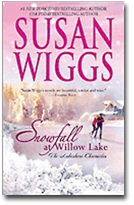 MIRA (February 2008)
MIRA (February 2008)
ISBN-10: 0778324931
ISBN-13: 978-0778324935
Excerpt
Avalon, Ulster County, New York
Every station on Noah Shepherd’s truck radio was broadcasting the incessant warning. The National Weather Service had issued an advisory—a prediction of snow, ice and wind—whiteout conditions in a lake-effect snowstorm.Authorities were urging people to stay home tonight, to keep the roads clear for emergency vehicles only. The county airport had closed hours ago. Even the heaviest snow-removal equipment was having trouble lumbering along the highway. Only madmen and fools would be out in this.
Well, madmen, fools and large-animal vets. Noah wished his windshield wipers had a faster setting. The wind-driven snow was coming so hard and fast it was like a solid wall of white. He could barely tell whether or not he was on an actual road.
Legend had it that during lake effect, magic happened. Right, he thought. If this was magic, he’d stick with reality.
After delivering the Osmonds’ foal, he should have taken them up on their offer to stay the night, waiting until the weather and roads cleared before making his way back to his home and adjacent clinic miles away. However, according to reports, it could be days before the storm played itself out and it was likely to get worse before it got better. He had the Palmquists’ geriatric beagle in the clinic, a cat recovering from spinal surgery and his own animals, which currently included an abandoned pup. He knew he could always call his neighbor, Gayle, to look in on them, but he hated to bother her. With her husband serving overseas and three kids underfoot, she sure as hell didn’t need to go traipsing over to his place to check on the animals.
Besides, his scrubs were covered in birth blood and fluid. He needed a shower, bad. He was wearing his favorite hat, a wool cap with earflaps. It was from his “early dork” phase, as one of his former girlfriends had called it. Noah had quite a few former girlfriends. Women his age tended to want something other than life with a country vet.
He leaned forward over the steering wheel, squinting at the road ahead. Illuminated by his headlamps, the snowflakes appeared to be flying straight at him in a movielike special effect. He thought of Star Wars, when the Millennium Falcon went into warp speed. And that thought, of course, inspired him to whistle the Star Wars theme between his teeth. Bored with crawling along, he imagined his windshield was a window to a galaxy far, far away. He was Han Solo, and the snowflakes flying at him were stars. He issued orders to his copilot, who perked up at the sound of his master’s voice. “Prepare for throttle up. Chewie, do you read? Go at throttle up.”
Rudy, a mutt in the passenger seat, gave a huff in response, fogging the window.
Noah’s last girlfriend, Daphne, used to accuse him of being a kid who would never grow up. And Noah, who had the subtlety of a jackhammer, suggested only half-jokingly that they make a few kids of their own so he’d have someone to play with.
That had been the last he’d seen of Daphne.
Yeah, he had a real way with the ladies. No wonder he worked exclusively with animals.
“General Kenobi, target sighted, a thermal detonator,” he said. In his mind, Noah pictured a galaxy slave clad in a chain mail bikini. If only the universe would actually send him someone like that.
Then he changed his voice to a wise baritone with a bad English accent. “I trust you will find what you seek. And… shit.” A pale shadow glimmered in the road right in front of him. He turned the wheel and eased off the accelerator. The truck fishtailed. Rudy scrabbled around on his seat, trying to stay put. In the middle of the road stood a big-eyed doe, ribs showing through its thick winter coat.
He leaned on the horn. The doe sprang into action, sprinting across the road, leaping the ditch and disappearing into darkness. Midwinter was the worst time of year for the wildlife. The starving season.
The radio station played its usual test of the emergency broadcast system. He turned it off.
Almost home. There were no landmarks visible to tell him so, just an inner sense that he was nearing home. Other than college and vet school at Cornell, he’d never lived anywhere else. Each rural mailbox was supposed to be marked by a tall segment of rebar, but the snowdrifts were too deep and the rebar and mailboxes were buried.
He sensed but could not see Willow Lake, which lay to the left of the road. Willow Lake was the prettiest in the county, a natural beauty fringed by the Catskills wilderness. At the moment it was invisible behind the curtain of snowfall. Noah’s place was across the road from the lake and slightly uphill. Along the lakefront itself were several old summer cottages, unoccupied in winter.
“General Azkanabi, we need reinforcements,” he said, hearing the imaginary music swell in his ears. “Send me someone without delay!”
In that instant, he noticed…something. A glimmer of red in the snowy shadows. The whistled theme song died between his teeth. He eased off the accelerator and kept his eyes on the crimson glow, eventually making out a matching light. Taillights, which seemed to belong to a car stuck in a snowbank.
He stopped the truck in the middle of the road. The car was still running; he could see a plume of exhaust coming from its unnaturally angled pipe. The taillights poured an eerie red light into the night. One of the headlights was buried in the snowbank. The other illuminated the deer that had been hit.
“Stay, boy,” Noah ordered Rudy. He grabbed his kit, which contained enough tranquilizer to put down the deer. He lit his flashlight, an elastic headlamp.
Switching on his hazard lights, he emerged into the stormy night. The flying snow and howling wind sliced at him like blades of ice. He hurried over to the car, spying a single occupant inside, a woman. She seemed to be fumbling with a cell phone.
She lowered the window. “Thank God you came,” she said, and got out of the car.
She was inadequately dressed for the weather, that was for sure. A high-fashion coat and thin leather boots with tall, skinny heels. No hat. No gloves. Blond hair, blowing wildly in the wind, partially obscured her face.
“You got here so quickly,” she yelled.
He figured she thought he was from roadside assistance or the highway department. No time to explain.
She seemed to share his urgency as she grabbed his sleeve and pulled him to the front of the car, wobbling a little on her boots. “Please,” she said, her voice strained with distress. “I can’t believe this happened. Do you think it can be saved?”
He aimed the beam of the headlamp at the deer. It wasn’t the doe he’d spotted earlier, but a young buck with a broken antler on one side, three points on the other. Its eyes were glassy and it panted in a way Noah recognized—the panicked breaths of an animal in shock. He saw no blood, but so often, the injuries that killed were internal.
Damn. He hated putting animals down. Hated it. “Please,” the stranger said again, “you have to save it.”
“Hold this,” he said, handing her a flashlight from his kit to supplement the headlamp. He eased himself down next to the animal, making a soothing sound in his throat. “Easy, fella.” He took off his gloves, stuffed them in a pocket of his parka. The rough coat of the deer warmed his fingers as he palpated its belly, finding no sign of fluid, no abnormal softening or heat. Maybe—
Without warning, the deer scrambled into action, legs flailing for traction in the deep, soft snow. Noah caught a sharp blow to the arm and backed off. The animal lurched to its feet and leaped over a snowbank; Noah instinctively moved in front of the woman to shield her from the hooves as the animal clambered off into the woods.
“I didn’t kill it,” the woman said. “You saved it.”
No, he thought, although it must have looked impressive, what with the deer jumping up as soon as he placed his hands on it. He didn’t say so, but there was still a good chance the buck might collapse somewhere in the forest, and die.
He turned off the headlamp and straightened up. She shone the flashlight into his face, blinding him. When he flinched, she lowered the beam. “I’m sorry,” she said.
Pulling on his gloves, he asked her, “Where are you headed?”
“Twelve forty-seven Lakeshore Road. The Wilson place. Do you know it?”
He squinted, getting his bearings. She had run her car off the road right by his driveway. “Another few hundred yards down toward the lake and you’re there,” he said. “I can give you a lift.”
“Thank you.” Snowflakes caught in her eyelashes, and she blinked them away. He caught a glimpse of her face—startlingly pretty, but pale and strained. “I’ll get my things.” She handed him the flashlight, then fetched a purse and a big tote bag from her car. There was also a roll-aboard, fluttering with tags. In the glow of the dome light, he could see words in some foreign language—’s-Gravenhage? He had no idea what that was. And another with an official-looking seal, like from the State Department or something. Whoa, he thought. International woman of mystery.
She turned off the ignition and the lights. “I don’t suppose there’s anything to be done about the car,” she said.
“Not tonight, anyway.”
“I’ve got a few more bags in the trunk,” she said. “Do you think it’s safe to leave them?”
“Probably not a huge night for thieves.” He led the way to his truck and opened the passenger-side door. “Get in the back,” he ordered Rudy, and the dog leaped into the jump seat behind.
The woman hesitated, clutching the purse to her chest and staring up at him. Even in the dim light from the truck’s cab, he could tell her eyes were blue. And she was no longer regarding him as the Deer Whisperer. Now she was looking at him as though he were an ax murderer.
“You’re looking at me as if I’m an ax murderer.”
“How do I know you’re not one?”
“Noah Shepherd,” he said. “I live right here. This is my driveway.” He gestured. The drive leading up to the house, flanked by pine trees weighted with snow, now lay beneath knee-deep drifts. A glimmer shone from the front window, and the porch light created a misty yellow aura …
The post Excerpt Snowfall appeared first on SusanWiggs.



